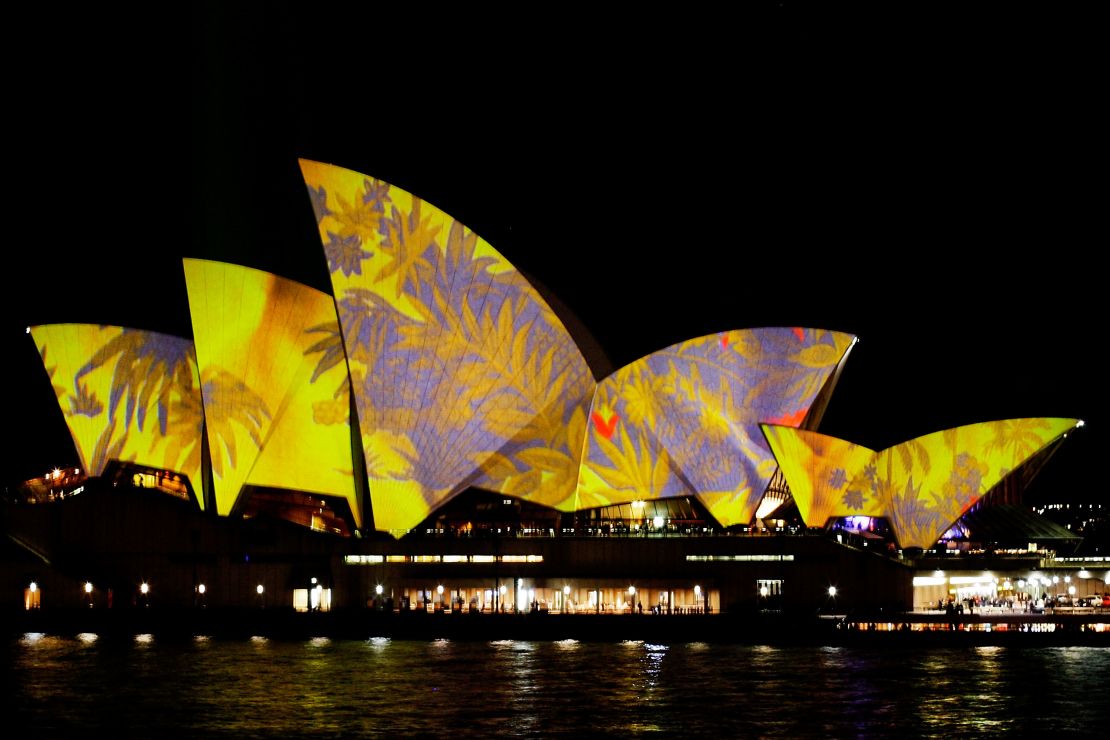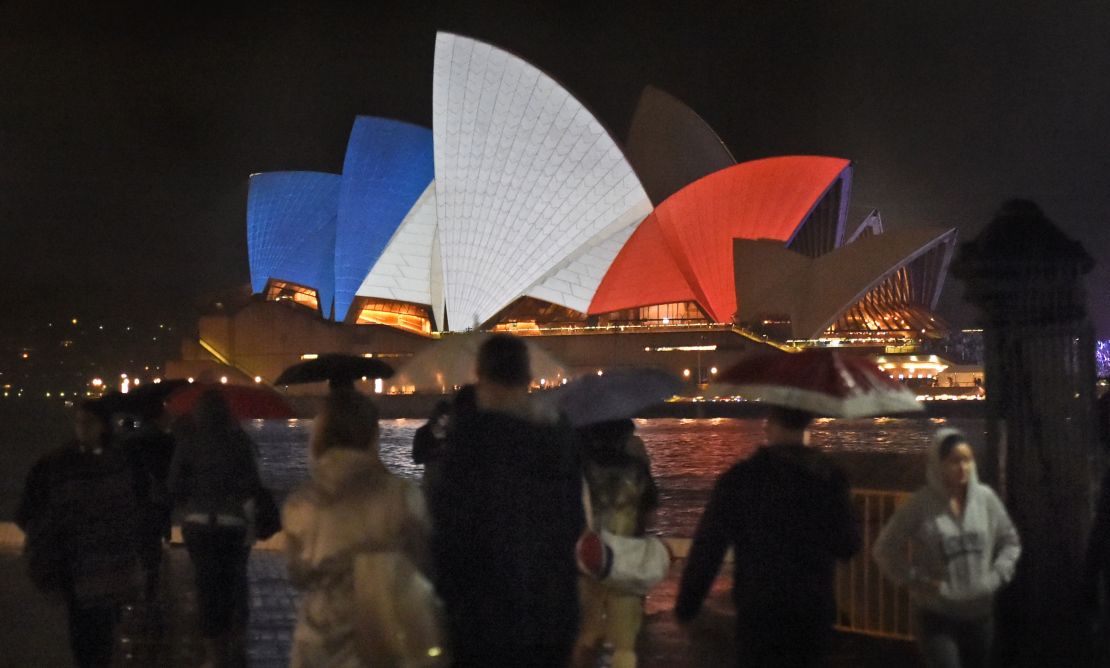A national debate is raging in Australia over an advertisement for a horse race being projected on the side of one of Australia’s most recognized landmarks, the Sydney Opera House.
Critics say it will cheapen the UNESCO World Heritage site but, behind the furor, deeper questions are being raised over the power of the pervasive, multibillion-dollar gambling industry in Australia.
“We know that the US blind spot is guns. What Australians now have woken up to … is our blind spot is captured by gambling interests,” World Vision Australia Chief Advocate Rev. Tim Costello, a longtime anti-gambling campaigner, told CNN.
Australians are some of the most prolific gamblers in the world. In 2016, Australians lost more money per person – an average of US $990 – than people from any other developed country. Singapore, the runner-up, lost only $650 per person in comparison.
The Everest Cup horse race is being held for only the second time in 2018 and has the largest prize pool for a “turf race” in Australia, coming in at $9.2 million (A$13 million).
But Racing NSW Chief Executive Peter V’landys said in a statement the advertisement would have nothing to do with gambling, adding that racing had been “part of Australia’s fabric of society since colonization.”
“It was first conducted to lift the morale of Australia’s first workforce. Like it or not it’s in our DNA,” he said.

‘Absolute sacrilege’
The uproar began when local media in Sydney ran stories on Friday questioning why the Opera House had refused permission for the race to be advertised on its iconic sails.
Controversial Sydney radio host Alan Jones conducted a fiery interview with Opera House Trust Chief Executive Louise Herron, calling for her to be fired over the decision. “Who the hell do you think you are?” Jones said to her. “You don’t own the Opera House, we own it.”
New South Wales Premier Gladys Berejiklian later ordered the Opera House to accept the request by Racing NSW to advertise the race.
The Opera House sails will be lit up for six minutes on Tuesday night, ahead of the race on October 13.
Both Berejiklian and Racing NSW said the advertising would be “much toned down” from the original request, with no Everest Cup logo and no horses’ names.
It won’t be the first time the building has been lit up for a sporting event – it has previously been illuminated for Australian events such as the Ashes cricket series and the Rugby World Cup. Berejiklian claimed that the Everest Cup in 2017 had been broadcast to 60 million people around the world and was an important drawcard for Sydney.
However, many in the city are angry. As of Tuesday, more than 270,000 people had signed a Change.org petition in support of the original decision by the Opera House to deny permission to “Alan Jones and his gambling mates at Racing NSW.” It was presented to the State Parliament Tuesday morning.
“Let’s remind Alan that the Opera House truly does belong to everyone, by supporting Louise Herron’s staunch defense of one of our City and Country’s few instantly recognizable heritage landmarks,” the petition said.
The Sydney Morning Herald, one of Australia’s most widely read publications, wrote in an editorial that to advertise a horse race on the Opera House would “tarnish (its) unique image.”
“Similarly, we are reluctant to project advertising on to state Parliament House or St Andrew’s Cathedral. Sure it would make money but it would destroy those buildings’ symbolic value,” the editorial read.
World Vision Australia’s Costello said advertising a horse race on the side of the Opera House was “absolute sacrilege.”
“(I think) Australia is having a national psychic vomit when they realized their icon had been handed over to the greediest, most destructive industry in the nation,” he said.
CNN contacted the NSW Premier’s office but was referred to her media appearances.
On Tuesday, Racing NSW suspended betting on the race “to avoid any perceived integrity risk” amid the furor.

Billion dollar industry
Gambling is a multibillion-dollar industry in Australia, but has negative consequences for tens of thousands of Australians who experience addiction problems with the industry.
According to the latest Australian Gambling Statistics, the total gambling expenditure in Australia in the 2016-2017 financial year was $16.7 billion (A$23.7 billion)
That’s the equivalent of every adult citizen in Australia spending $881.61 (A$1,251) every year.
A report by Australia’s productivity commission found 115,000 people in the country were considered “problem gamblers,” just under one in every 200 people across the entire country. In total, 280,000 people were considered at risk.
On top of the racing and casino revenue, one of the largest and most valuable gambling segments is the poker machine (also known as fruit machine or slot machine) industry.
There are almost 200,000 of the flashy, easily accessible machines across Australia, almost one for every 100 people. In some states, you can put up to $5,284 (A$7,500) into a machine in one sitting.
“Over 400 Australians take their lives every year, just from (poker machines.) I do the funerals of many of them, far more than gun deaths,” Costello told CNN.
Gambling donations
NSW Premier Berejiklian wasn’t the only person who came out strongly in favor of the Opera House being used to advertise the upcoming horse race.
Speaking to journalists on Sunday, Prime Minster Scott Morrison said he didn’t see what opponents of the plan were being so “precious” about.
“This is one of the biggest events of the year. Why not put it on the biggest billboard Sydney has?” Morrison told journalists.
Australian politicians have a long history of supporting the gambling industry and avoiding efforts at reform. In 2012, then-prime minister Julia Gillard broke her agreement with a minority partner over attempts to put strict limits on how much gamblers could spend at poker machines.
Costello said Australia’s state governments have been heavily reliant on revenue from gambling for years, describing it as their “dirty little secret.”
Analysis by Australian academics found that on top of the revenue from gaming, the gambling industry had also given more than A$1 million in donations to Australian political parties during the last federal election year.
“They solved their revenue problems at massive social cost. Australians like to think we are baptized into gambling with eucalyptus oil at birth, but it’s not the case,” Costello said.







